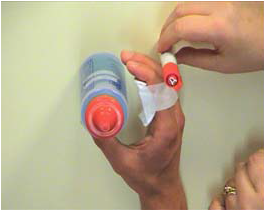AIM:
To train flexion and extension of the MCP joints with the IP joints in some flexion in preparation for grasping and releasing objects
Rationale:
An important component for grasping and releasing objects is the ability to flex and extend the MCP joints while the IP joints are in some flexion. Task-related training is set up so the patient can practice with manual guidance from the therapist if necessary.
Equipment:
- Table
- Chairs
- Cylindrical objects, eg, bottle
- Targets, eg, pen
- Semicircular splint, eg, half a polystyrene cup (if necessary)
- Tape
Key Points:
- Patient is positioned in sitting, arm supported on table, shoulder slightly flexed, elbow flexed
- Patient grasps and releases a cylindrical object by flexing and extending at the MCP joint
- Ensure IP joints remain in some flexion
- A splint may be applied to prevent IP joint extension (as shown in video)
- Therapist is positioned to the side of the patient and provides manual guidance at the hand if necessary
- Therapist may position a target at the back of the hand, at the level of the proximal IP joint to cue required range of movement
Common Errors:
- Patient extends IP joints excessively
- Patient moves wrist instead of MCP joints
Progression and Variety:
- Decrease/remove manual guidance and/or splintRemove support from table
- Increase speed of movement
- Sustain muscle contraction
- Change size of objects placed in the hand

